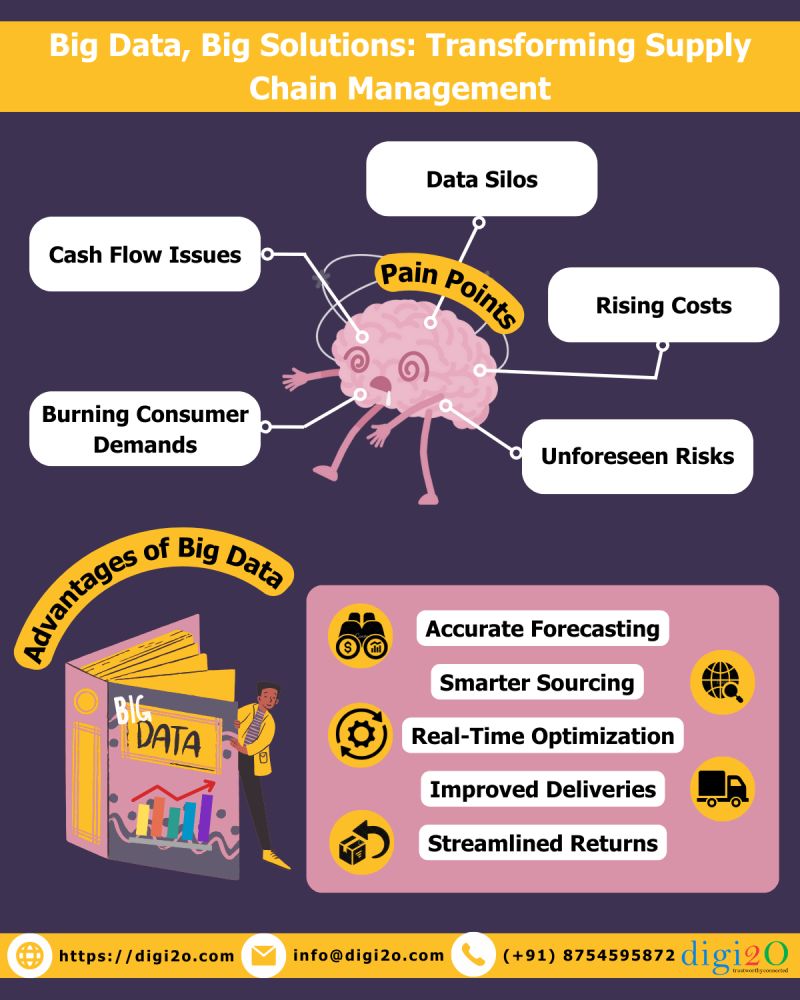
In today's dynamic business landscape, where the global market is more interconnected than ever before, supply chain efficiency stands as a cornerstone of success for enterprises across industries. The ability to streamline operations, optimize resources, and meet consumer demands promptly is vital for sustainable growth and competitiveness. Leveraging big data emerges as a game-changer in this realm, offering unparalleled insights and opportunities for enhancing supply chain efficiency.
Big data refers to vast volumes of structured and unstructured data generated at an unprecedented velocity. These datasets encompass a myriad of sources, including customer transactions, social media interactions, sensor data, and more. The essence of big data lies in its three defining characteristics: volume, velocity, and variety.
In the context of supply chain management, big data serves as a catalyst for transformative change. By harnessing advanced analytics and machine learning algorithms, organizations can extract valuable insights from vast data sets, enabling data-driven decision-making at every stage of the supply chain.
Big data empowers organizations to predict demand patterns with unprecedented accuracy. By analyzing historical data, market trends, and consumer behavior, businesses can anticipate fluctuations in demand, enabling proactive inventory management and resource allocation.
Efficient inventory management is critical for minimizing costs and maximizing profitability. Big data analytics enable real-time visibility into inventory levels, demand forecasts, and supplier performance, facilitating optimal inventory replenishment and reducing stockouts or excess inventory.
Big data analytics drive operational excellence by identifying bottlenecks, inefficiencies, and areas for improvement within the supply chain. By optimizing route planning, warehouse operations, and transportation logistics, organizations can streamline processes, reduce lead times, and enhance overall efficiency.
Effective collaboration with suppliers is essential for ensuring a seamless flow of goods across the supply chain. Big data facilitates transparent communication, performance tracking, and risk management, fostering stronger partnerships and enabling collaborative problem-solving.
In today's volatile business environment, mitigating supply chain risks is paramount. Big data analytics enable proactive risk identification and mitigation strategies by monitoring factors such as geopolitical events, natural disasters, and supplier disruptions, thereby safeguarding operations and enhancing resilience.
To leverage big data effectively, organizations must centralize and integrate data from disparate sources, including enterprise systems, IoT devices, and external data streams. Implementing robust data governance frameworks and data management solutions is essential to ensure data quality, integrity, and accessibility.
Deploying advanced analytics tools and predictive modelling techniques is crucial for extracting actionable insights from big data. Machine learning algorithms, data visualization tools, and statistical techniques enable organisations to identify patterns, trends, and anomalies, empowering data-driven decision-making and strategic planning.
Building collaborative partnerships with technology vendors, data scientists, and industry experts is instrumental in driving successful big data initiatives. Additionally, investing in talent development and data literacy programs equips employees with the necessary skills and knowledge to harness the full potential of big data analytics.
In conclusion, leveraging big data presents unparalleled opportunities for enhancing supply chain efficiency, agility, and competitiveness. By harnessing advanced analytics, organizations can unlock valuable insights, optimize processes, and mitigate risks, thereby driving sustainable growth and value creation in today's digital era.
Designed by W3Squad